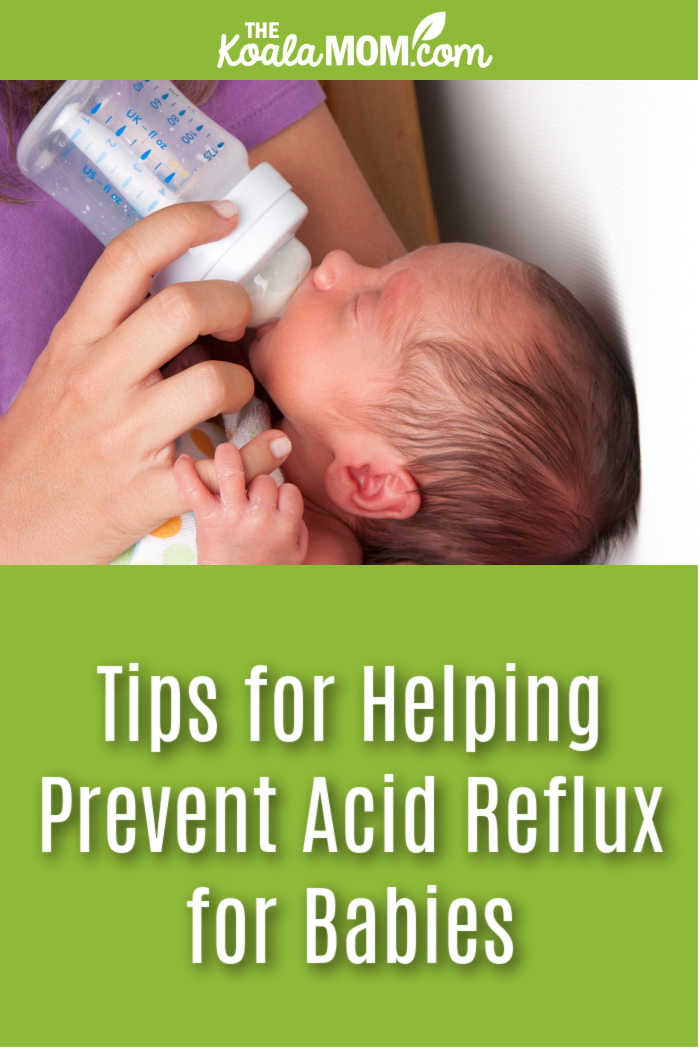Acid reflux is a very common issue for babies, especially before 6 months of age. According to the National Institutes of Health, two out of three 4-month-old infants suffer from severe reflux. So most parents have to learn sooner or later how to cope with this problem.
No matter what baby food you’re giving to your little one (breast milk or formula), be prepared for the acid reflux symptoms to show up and try not to stress out too much about it. If your infant drinks formula, there are plenty of specialized products invented specifically for babies with reflux.

What is acid reflux?
Baby acid reflux or gastroesophageal reflux is a condition when the stomach contents flow back into the tube connecting a baby’s mouth and stomach. This happens because the infant’s lower esophageal sphincter muscle isn’t fully developed yet. It can cause milk spitting, vomiting, and coughing. A lot of babies younger than 6 months old suffer from mild or severe reflux, but there are useful tips that can help you reduce the risk of acid reflux considerably.
Tips to prevent acid reflux in babies
- Feed your baby in an upright position. To help your infant keep the milk in his stomach after swallowing, always feed baby in a vertical position. Gravity will do its thing. If your little one has reflux, feeding her in a horizontal or even semi-inclined position can worsen the situation. There is a variety of upright baby feeding positions you can choose from, including a “koala hold”, an “upright football”, etc.
- Small frequent feedings are better than long ones. Infants have tiny stomachs that can’t hold a lot of milk. That’s why overfeeding can lead to reflux. It’s better to give your 4-month-old or younger child only 2 oz of baby formula at a time and another 2 oz in 20-30 minutes, or nurse more frequently for shorter periods.
- Let your baby drink at his pace. Never hurry your little one during the feeding. Let her take the bottle(or your nipple at the pace your infant chooses. It’s sometimes easier for parents who bottle feed their baby to quickly pour the milk into the baby’s throat and be done with it, but this can cause harm to your infant, so don’t hurry and make sure baby has enough time to properly suck and swallow the formula. Make pauses from time to time to prevent the milk from coming back up.
- Pause to burp your infant. Feeding your baby quickly and without breaks is not recommended because it causes air swallowing, overfeeding, gas buildup, and acid reflux. Make pauses in feeding and tap your little one’s back for him/her to burp the extra air. It will help digest the breast milk or infant formula better.
- Choose the right baby formula. Luckily, we today have an awesome assortment of different infant formulas suitable for different situations and health issues. Such hypoallergenic products as HiPP HA Combiotik are created for babies showing signs of cow’s milk protein intolerance and suspected allergies, Bebe M Anti-Reflux Rice-Based Formula was invented for infants with reflux symptoms, and HiPP Comfort Special Formula is for babies with colic – and that’s only a few examples.
- Pick the right baby bottle. Natural breastfeeding “forces” the baby to work more on sucking and swallowing, which develops the throat, esophagus, and stomach muscles, while bottle feeding often just pours milk into the infant’s throat. What can you do about it? Pick a slow-flow bottle nipple or – even better – an air-free baby bottle. This might help with acid reflux.
Always consult with your baby’s pediatrician regarding any health issues. Don’t self-diagnose your baby if you see any feeding problems. Most probably, you won’t be able to distinguish reflux from allergy or lactose intolerance – that’s a doctor’s responsibility.
Photo credit: Depositphotos.


No Responses Yet